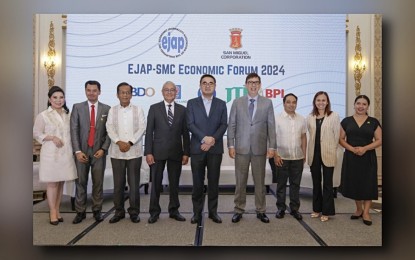
ECONOMIC FORUM. ANC reporter and EJAP vice president for external affairs Mimi Ong, Reuters correspondent and EJAP president Neil Jerome Morales, National Economic and Development Authority Secretary Arsenio Balisacan, Bangko Sentral ng Pilipinas Governor Eli Remolona Jr., Special Assistant to the President Frederick Go, Finance Secretary Ralph Recto, Budget Undersecretary Joselito Basilio, National Treasurer Sharon Almanza, and PNA reporter and EJAP vice president for internal affairs Kris Crismundo (from left) during the Economic Journalists Association of the Philippines-San Miguel Corp. Economic Forum in Intramuros, Manila on Monday (July 8, 2024). The Marcos administration's economic managers laid out the strategies to safeguard the Philippine economy as it continues to recover from the impacts of the pandemic. (Photo courtesy of DOF)
MANILA – The economic managers of President Ferdinand R. Marcos Jr. laid out the administration’s strategies to safeguard the Philippine economy from internal and external headwinds as it continues to recover from the impacts of the pandemic.
Department of Finance Secretary Ralph Recto, Bangko Sentral ng Pilipinas (BSP) Governor Eli Remolona Jr., Special Assistant to the President for Investment and Economic Affairs Frederick Go, National Economic and Development Authority Secretary Arsenio Balisacan and Department of Budget and Management Undersecretary Joselito Basilio gathered at the Economic Journalists Association of the Philippines-San Miguel Corp. (EJAP-SMC) Economic Forum at Ayuntamiento de Manila in Intramuros on Monday.
Budget Secretary Amenah Pangandaman also delivered a recorded video message.
Food security
Recto said food security is the top priority of the Marcos administration, targeting to shield Filipinos from high food prices which have the biggest impact on inflation.
Inflation rate also dictates the policy stance of the BSP, which affects other economic activities like investments, lending and hiring.
Recto said Filipinos would start to feel the impacts of Executive Order 62, which lowers tariff of rice from 35 to 15 percent, in August as average price of rice could go down to PHP50 per kilogram from PHP54.50 per kilo in June.
“Had we not taken this step, rice prices would have remained above PHP50, causing significant pain for consumers,” Recto said.
“A sustained high price of rice could continue to drive inflation, delaying the reduction of policy interest rates by the BSP and derailing the country’s economic growth trajectory."
Remolona said the better-than-expected 3.7-percent inflation in June provides “a bit more scope for easing, possible in August.”
He affirmed that if inflation continues to fall for the rest of the year, the Monetary Board could reduce rates ahead of the US Federal Reserve System.
“We, at the BSP, we look at our data. (T)he Fed is among the data that we look at. In our case, our numbers look better, I think, than the numbers for the US. The US is facing sticky inflation, and so they’re reluctant to cut but nonetheless I think, we may cut sometime this year. We just don’t know who is the first, so that’s up to the data,” Remolona said.
Long-term goals
Balisacan said that in order for the Philippines to future-proof its growth in the long run, the government should intensify attracting investments and boost its exports.
The Philippine economy, Balisacan said, is heavily dependent on services, which accounted about two-thirds of the overall growth in recent years.
“Investments have contributed to less than half our GDP (gross domestic product) growth, but exports have grabbed our growth, with our exports performing sluggishly relative to our income,” he said.
He added that the steady decline of agriculture and manufacturing share in GDP significantly limits the country’s opportunities for poverty reduction.
“In the recent economic history of nations, especially in Asia, manufacturing growth was a primary driver of poverty reduction. Not surprisingly, since manufacturing is critical to the productive absorption of unskilled and semi-skilled labor, especially low-productivity labor around agriculture,” Balisacan said.
Meanwhile, Go said Marcos’ investment missions abroad promote the country as a strategic investment destination in the region.
Go said the administration pushes for investment-friendly policies such as streamlining regulations, easing restrictions and building critical infrastructure.
Ongoing efforts of the government include passing the Corporate Recovery and Tax Incentives for Enterprises Maximize Opportunities for Reinvigorating the Economy (CREATE MORE) bill; promoting investments in the Luzon Economic Corridor; and upskilling and reskilling the workforce in cybersecurity.
“These initiatives and reforms aim to reduce barriers to create an environment conducive for business and economic growth. And they all work towards our ultimate goal, which is to make the country a top investment destination,” Go added.
In her video message, Pangandaman said the timely disbursement of budget to fund the government’s programs, especially in social services and initiatives, would support the country’s economic growth. (PNA)
